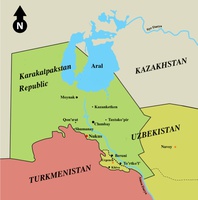|
|
- Title
- KARAKALPAKSTAN (Uzbekistan, collecte J.During)
- Description
- Enregistrements audio de musiques des bardes (zhirau et baqsy) Qaraqalpaks d'Ouzbekistan, par Jean During, janvier 2000, à Recorded in Nukus and Kegely.
The Karakalpaks are a Turkic people of Central Asia who presently number less than 600,000, around 80% of whom live in the northeast of Uzbekistan in a region known as the Autonomous Republic of Karakalpakstan within Uzbekistan.
Epic poems dastan (or destan) are sung or cantilated by three sorts of dastanshy (singers of dastans): jirow bards, baqsy bards (bakhshi), and qissakhan storytellers.
The dastans performed by jirow bards are always sung accompanied on the qobyz (bowed fiddle), to melodic schemes known as nama.
The bards (baqsy) of the southern school perform the dastan (epic poems) with the dutar (lute), the ghirjak (or qijak, spike fiddle), and the balaman (small clarinet).
The transliteration is slightly simplified and not always consistent. Often i should be written > y, k > q, a > à etc.
I express my thanks to Khalmurza KURBANOV (son of Turghanbay) for his help in documenting all the pieces collected, and to Sultonali Khudoberdiev who accompanied me during this journey. - Code
- CNRSMH_During_005
- Recording year (from)
- 2000
- Recording year (until)
- 2000
- Total available duration
- 08:38:50
- Fonds
- Fonds Jean During
Related media
| Media | Preview |
|

|
|

|
 Collections
Collections
| Title | Digitized | Description | Code |
|---|---|---|---|
| Karakalpakstan. (Uzbekistan). Lyric songs of the baqsy. Collected by J. During 2000. |
|
La plupart de ces chants sont en rapport avec des épopées : Gharip Ashyq, Qirmandaly (épisode de Koroghly), Sayat Khan Hamra. D'autres sont sur des poésies classiques ou populaires. On trouvera les chants de l'épopée de Qirmandaly dans le dossier Karakalpakstan. Oratures, mais intégrés à la narration entière de l'épopée. Les mélodies (nama) ont chacune un nom, mais des poèmes différents peuvent être chantés sur le même nama (du mot persan lettre, livre). Most of these songs are related to epics: Gharip Ashyq, Qirmandaly (episode of Koroghly), Sayat Khan Hamra. Other ones are based on classical or popular poems. The songs from Qirmandaly's epic can be found in this site (Karakalpakstan.Oratures. J. During 2000 collection), but incorporated in the unfolding of the narration. Each melody (nama) has a name, but different poems can be sung on the same nama (nama : from the Persian word letter, book). | CNRSMH_I_2020_007 |
| Karakalpakstan (Uzbekistan). Lyrical and epic bards (jyrau et baqsy). Oratures lyriques et épiques. Collected by J. During 2000 |
|
The great baqsy Turghanbay Kurbanov had never recorded Qirmandaly epic, therefore this document has a historical value. The repertoire of the jyrau/zhyrau Jumabay Bazarov had been recorded in its entirety during the Soviet era, but it was only a part of the repertoire of the jyrau of the previous generation. L'épopée de Qirmandaly n'avait jamais été enregistrée par le grand baqsy Turghanbay Kurbanov. Ce document a donc une valeur historique. Le répertoire du jyrau/zhyrau Jumabay Bazarov avait été enregistré intégralement à l'époque soviétique, mais il ne constituait qu'une partie seulement du répertoire des jirau de la génération précédente. (Le j se prononce ji, non dji) | CNRSMH_I_2020_008 |
| vide | En cours de traitement. | CNRSMH_I_2020_009 | |
| Karakalpakstan (Uzbekistan). Instrumental performances. Collected by J. During 2000. |
|
Instrumental melodic models (nama), mainly played on the dotar/dutar | CNRSMH_I_2020_010 |

 Corpus : KARAKALPAKSTAN (Uzbekistan, collecte J.During)
Corpus : KARAKALPAKSTAN (Uzbekistan, collecte J.During)
